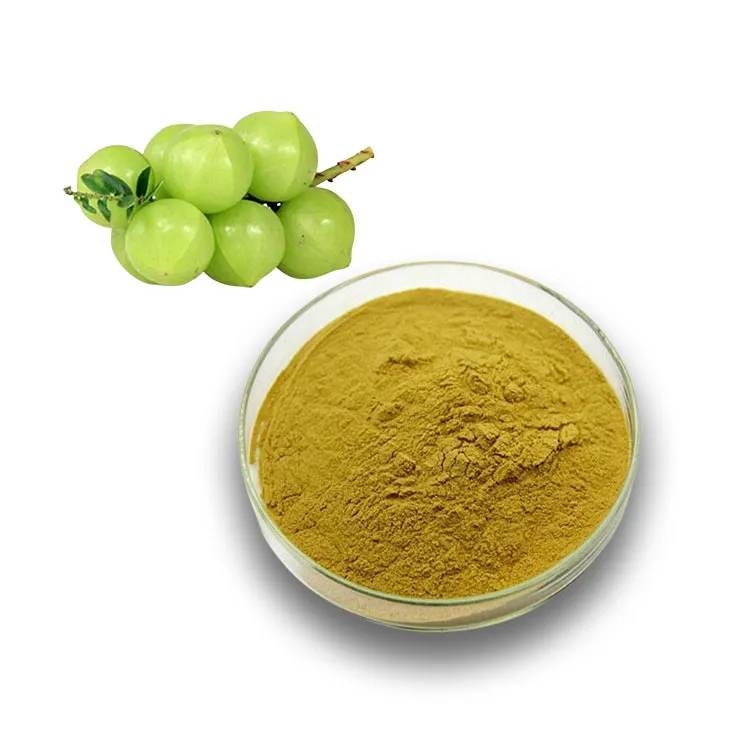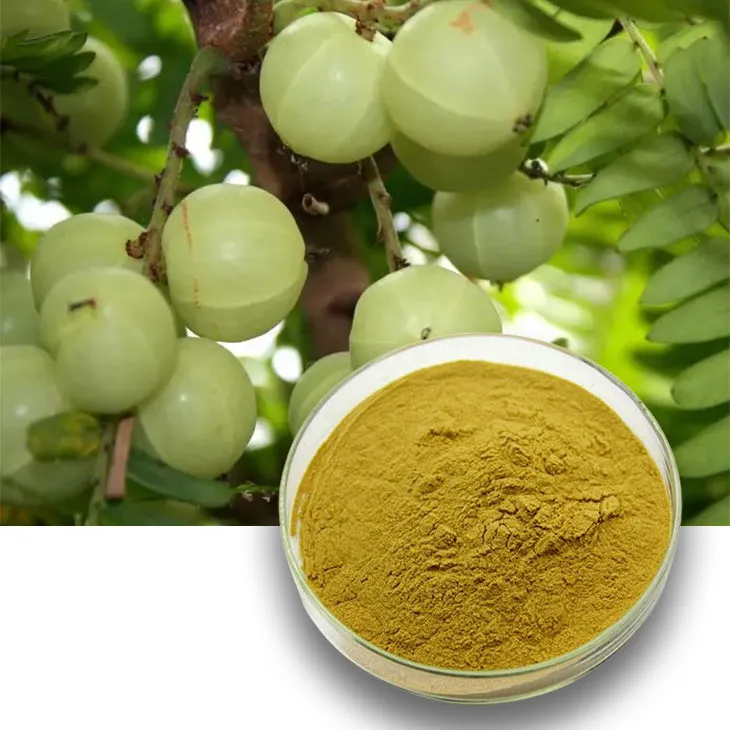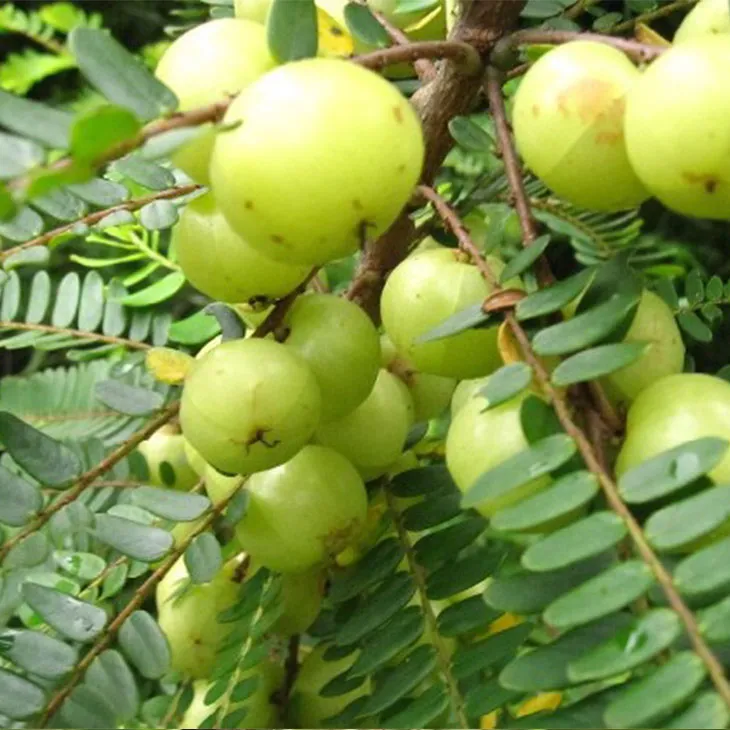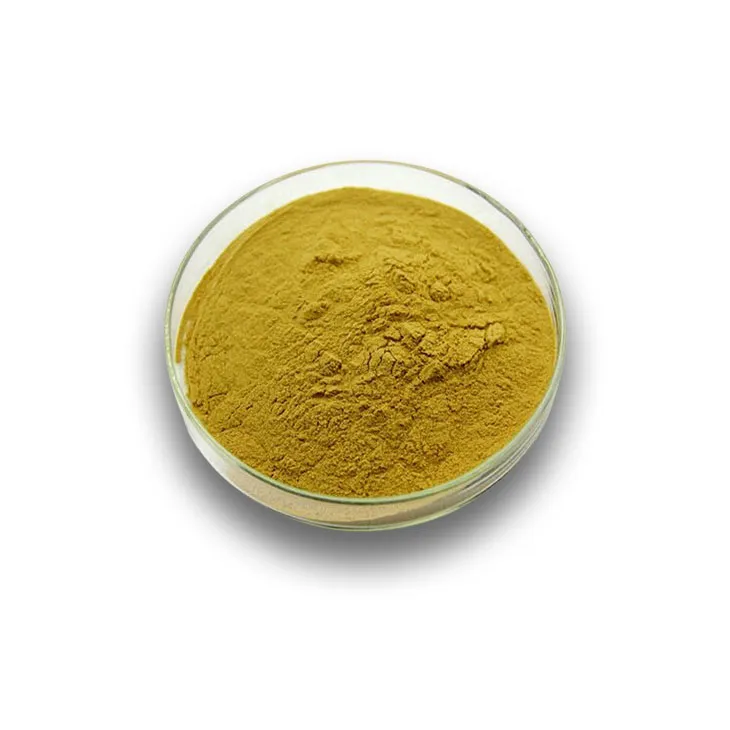- 0086-571-85302990
- sales@greenskybio.com
The taste of ripe Phyllanthus emblica and natural Phyllanthus emblica extract.
2024-11-12

1. Introduction
Phyllanthus emblica, also known as Indian gooseberry, is a fruit - bearing plant with a long history of use in traditional medicine and cuisine. The ripe fruit of Phyllanthus emblica has a distinct taste, and its natural extract has been gaining significant attention in recent years due to its numerous potential health benefits and versatile applications.

2. The Taste of Ripe Phyllanthus emblica
The taste of ripe Phyllanthus emblica is a complex combination of flavors. It is characterized by an initial bitterness that is followed by a refreshing tanginess.
2.1 Bitterness
The bitterness in ripe Phyllanthus emblica is due to the presence of certain compounds. These compounds not only contribute to the taste but may also have potential health - promoting properties. Bitterness is often associated with antioxidant and anti - inflammatory activities in many plants, and Phyllanthus emblica is no exception.
2.2 Tanginess
The tangy flavor in the ripe fruit provides a refreshing quality. It is likely related to the fruit's acidity levels. The tanginess balances out the bitterness, creating a unique taste profile that is both interesting and appealing in different culinary and medicinal applications.

3. Composition of Natural Phyllanthus Emblica Extract
The natural extract of Phyllanthus emblica is rich in a variety of components, which contribute to its diverse applications.
3.1 Vitamins
- It contains a significant amount of vitamin C. Vitamin C is an essential nutrient known for its antioxidant properties, which help in protecting the body's cells from damage caused by free radicals.
- Also, it has other vitamins such as vitamin A, which is important for vision, and vitamin E, another antioxidant vitamin that plays a role in skin health and immune function.
3.2 Minerals
- Phyllanthus Emblica Extract is a source of minerals like calcium. Calcium is crucial for maintaining strong bones and teeth.
- It also contains iron, which is necessary for the production of hemoglobin in red blood cells and for oxygen transport in the body.
3.3 Bioactive Compounds
- Tannins are present in significant amounts. Tannins have antioxidant, anti - inflammatory, and antimicrobial properties. They can also help in improving digestion by binding to proteins in the digestive tract.
- Flavonoids are another group of bioactive compounds. These are known for their antioxidant, anti - inflammatory, and potential anti - cancer properties. They also contribute to the overall health - promoting effects of the Phyllanthus Emblica Extract.

4. Uses of Natural Phyllanthus emblica Extract
The natural extract of Phyllanthus emblica has a wide range of applications in different industries.
4.1 Herbal Remedies
- In traditional medicine systems, Phyllanthus emblica extract has been used to treat various ailments. For example, it is believed to have hepatoprotective properties, meaning it can protect the liver from damage. It may help in improving liver function by reducing inflammation and oxidative stress in the liver cells.
- It has also been used for its anti - diabetic properties. Some studies suggest that it can help in regulating blood sugar levels by improving insulin sensitivity or by inhibiting certain enzymes involved in carbohydrate metabolism.
4.2 Food and Beverage Industry
- As a natural flavoring agent, Phyllanthus emblica extract can add a unique and refreshing taste to food and beverages. Its tangy and slightly bitter flavor can be used to enhance the taste profile of products such as juices, smoothies, and even some confectionery items.
- It also provides functionality in food products. Due to its antioxidant properties, it can act as a natural preservative, extending the shelf life of food products by preventing oxidation of fats and other components.

5. Factors Affecting the Taste and Extract Quality of Phyllanthus emblica
Several factors during the growth of Phyllanthus emblica can influence the taste of the fruit and the quality of its extract.
5.1 Climate
- The temperature during the growth period can have an impact. Cooler temperatures may lead to slower growth but can sometimes result in a more concentrated flavor in the fruit. Warmer temperatures, on the other hand, may speed up growth but could potentially affect the balance of flavors.
- Rainfall also plays a role. Adequate rainfall is necessary for proper growth, but excessive rainfall can lead to waterlogged soil, which may affect the nutrient uptake by the plant and consequently the taste and quality of the fruit.
5.2 Soil Conditions
- The type of soil affects the availability of nutrients to the plant. For example, well - drained, fertile soils rich in organic matter are generally more favorable for Phyllanthus emblica growth. These soils can provide a good supply of essential nutrients such as nitrogen, phosphorus, and potassium, which are important for the development of a good - tasting fruit and a high - quality extract.
- The pH of the soil is also crucial. A slightly acidic to neutral pH range is often optimal for Phyllanthus emblica. If the soil is too acidic or alkaline, it can affect the plant's ability to absorb certain nutrients, thereby influencing the taste and the composition of the extract.
5.3 Cultivation Practices
- Pruning is an important cultivation practice. Proper pruning can help in shaping the plant, improving air circulation, and promoting better sunlight exposure. This can lead to healthier plants and potentially better - tasting fruits. Inadequate pruning may result in overcrowded branches, which can affect the development of the fruit and its taste.
- Fertilization also has an impact. The right type and amount of fertilizers are needed to ensure proper growth. Over - fertilization can lead to an imbalance in nutrient uptake, which may be reflected in the taste of the fruit. Under - fertilization, on the other hand, can result in nutrient deficiencies and affect the overall quality of the fruit and its extract.
6. Conclusion
Phyllanthus emblica, with its unique taste when ripe and valuable natural extract, is a remarkable plant. The taste of the ripe fruit, combining bitterness and tanginess, offers a distinct sensory experience. The natural extract, rich in vitamins, minerals, and bioactive compounds, has a wide range of uses in herbal remedies and the food and beverage industry. Understanding the factors that influence the taste and extract quality during the growth of Phyllanthus emblica can help in optimizing cultivation practices to produce high - quality fruits and extracts. Overall, further research and exploration of Phyllanthus emblica are warranted to fully unlock its potential in various fields.
FAQ:
What is the main taste of ripe Phyllanthus emblica?
The main taste of ripe Phyllanthus emblica combines bitterness and a kind of refreshing tanginess.
What are the components in the natural Phyllanthus emblica extract?
The natural Phyllanthus emblica extract contains various vitamins, minerals, and bioactive compounds.
What are the uses of the natural Phyllanthus emblica extract?
The extract is used in herbal remedies and provides natural flavor and functionality in the food and beverage industry.
How do growth factors affect the taste of Phyllanthus emblica?
Different growth factors can influence the taste of Phyllanthus emblica, for example, factors like soil quality, sunlight exposure, and water availability may change the chemical composition in the fruit which in turn affects the taste.
How do growth factors affect the quality of the Phyllanthus emblica extract?
Growth factors such as climate, soil nutrients, and agricultural practices can impact the chemical composition of Phyllanthus emblica. These changes in composition can directly affect the quality of the extract, for instance, better growth conditions may lead to a higher content of bioactive compounds in the extract.
Related literature
- Title: Analysis of the Chemical Composition of Phyllanthus emblica and Its Extract"
- Title: "The Influence of Growth Environment on Phyllanthus emblica Taste and Extract Quality"
- Title: "Phyllanthus emblica: From Taste to Therapeutic Properties in Extracts"
- ▶ Hesperidin
- ▶ Citrus Bioflavonoids
- ▶ Plant Extract
- ▶ lycopene
- ▶ Diosmin
- ▶ Grape seed extract
- ▶ Sea buckthorn Juice Powder
- ▶ Fruit Juice Powder
- ▶ Hops Extract
- ▶ Artichoke Extract
- ▶ Mushroom extract
- ▶ Astaxanthin
- ▶ Green Tea Extract
- ▶ Curcumin
- ▶ Horse Chestnut Extract
- ▶ Other Product
- ▶ Boswellia Serrata Extract
- ▶ Resveratrol
- ▶ Marigold Extract
- ▶ Grape Leaf Extract
- ▶ New Product
- ▶ Aminolevulinic acid
- ▶ Cranberry Extract
- ▶ Red Yeast Rice
- ▶ Red Wine Extract
-
Hedyotis Diffusa Extract
2024-11-12
-
Bayberry Extract
2024-11-12
-
Selenium yeast
2024-11-12
-
Chasteberry Extract
2024-11-12
-
Garcinia Cambogia Extract
2024-11-12
-
Apricot Powder
2024-11-12
-
Ginger Extract
2024-11-12
-
Chia Seed Powder
2024-11-12
-
Green coffee bean Extract
2024-11-12
-
Carrageenan Extract Powder
2024-11-12





















